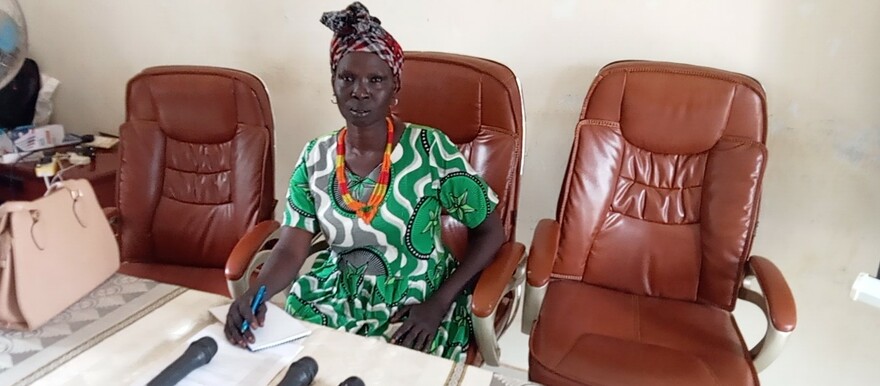Abuk Deng Ngor, commonly referred to as General Abuk, is believed to be the second and toughest elected female traditional chief in South Sudan, after Magdalena Ehisa Tito from Eastern Equatoria State.
Abuk deals with women, girls and children issues in her daily duties at customary law courts in Northern Bahr al Ghazal State.
As she grew up as a little girl, Abuk dreamed of helping her community. That dream became a reality when she was sworn in as the traditional chief of Aweil South County in October 2020.
Abuk explains to Radio Tamazuj how her journey to becoming a traditional chief faced challenges as her husband opposed her ambition of leading the community.
“I didn’t start the job immediately because my husband refused to see me reaching this level, and I spent more than one year without getting to the office.”
Abuk, whose grandfather was a traditional chief, said the leadership skills were ordained into them.
“This position is not strange for us. It is in our blood; that’s why if we are married to foreign lands, we are appointed in this job,” she said.
Abuk, who handles women’s issues in the community, says she does this job because she loves to help her community.
Her role is also limited to settling disputes involving inter-communal violence and cattle-related conflicts in the community.
“I am dealing intensively with the issues of women. I am in the office for their benefit, not for men. If a woman comes with a pregnancy complaint, no male chief is allowed to make a checkup. I am the one to make checkups and bring back clear reports, and I am the one to investigate whether she committed adultery or not. I am also the right person to interrogate raped cases, so that is my duty among the male chiefs.”
She says she has worked hard to get where she is today. Fewer women have the courage to step up for such leadership positions in South Sudan over gender stereotypes.
But Abuk now encourages all women across the country to step up and take up such roles in society.
“I deeply encourage every woman, and I congratulate any appointed female chief in her family. I want you to support women.”
As a woman, Abuk says her role is to advise women to be role models for their children and the youths. She believes women also have the responsibility of keeping the family together and imparting good morals to the children and the community at large.
South Sudan still faces a culture that limits the engagement of women in public spaces, as well as a culture that does not question and address violence against women in most communities.




